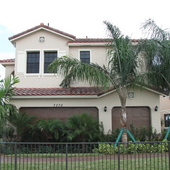Basic Landscaping Principles for Florida Yards
Start off Right, Select the Right Plant For Your Location!
- Make a note of the type of soil, sunlight exposure and water conditions of the planting site before you shop. Choose plants that thrive under the conditions you noted. Almost any plant will survive in your landscape if you plant it in the right place.
- Limit the number of plants that need a lot of water or care.
- Keep only as much grass as you directly use for recreation and other purposes. Plant beds and mulched areas use less water than grass.
- Remove invasive exotic plants so they don't steal water and nutrition from Florida-friendly plants.
Watering
- Water your lawn and plants only when you know they need it or show signs of stress.
- Use a rain gauge or moisture sensor so you will know if rainfall has done the job.
- Install a drip or micro-spray system in your plant beds. They use water more efficiently
than traditional spray heads.- Install an automatic rain shutoff device to avoid watering when it's raining.
- Stop overwatering! Overwatered grass has short roots that make it harder to survive pest
attacks, disease and drought.- Collect water in a rain barrel to use to water your plants.
- Typically, at least 50% of water used by households is used outdoors. Efficient watering will not only
help you save money and conserve water, but can also create a healthier landscape.Fertilizing
- Fertilize lawns, trees and plants only to maintain health. Don't exceed recommended
amounts. Fertilizer will not help poor growth caused by too much shade, disease or pests.- Use slow-release fertilizers that make nutrients available to plants for a longer time. They are kinder to the environment and are usually more cost-effective.
- Use iron instead of nitrogen if you want to "green-up" your lawn.
- Hold off on fertilizing if a heavy rain is expected, and don't overirrigate after applying.
- Follow the directions on the fertilizer package and use a drop spreader instead of a rotary
spreader to apply it.- Avoid weed and seed products.
- When too much fertilizer is applied to landscapes, it seeps past the root zone of the grass, plants or trees and into the aquifer or runs off into water bodies. Plants, animals and people depend on
clean water for survival.Mulch
- Cut down on mowing by replacing grass with mulch in areas that are shaded or difficult to
mow.- Keep the level of mulch up to 2-3 inches by applying it once or twice a year.
- Keep mulch 2 inches from the base of plants to avoid disease.
- Let fallen tree leaves stay under a tree to create self-mulching areas.
- Look for cypress mulch that is not harvested from Florida's wetlands.
- Choose recycled mulch or alternatives like melaleuca, leaves, pine needles or bark.
- Who likes to weed? Keeping mulch on your plant beds helps control weeds, retain soil moisture and
reduce erosion and stormwater runoff.Insects and Yard Pests
- Learn to identify beneficial insects and let them do the work for you.
- Be tolerant! Low levels of pests will do minimal damage.
- Check plants regularly and prune off a plant's infected areas or pick off insects when possible.
- Use pesticides only to spot-treat affected plants and lawn areas. Avoid blanket applications.
- Choose the least-toxic pesticides such as horticultural oils, insecticidal soaps and Bacillus thuringiensis (BT).
- Read and follow pesticide labels carefully for safe use and disposal.
- When it comes to pest management, nature takes care of itself! Misused pesticides in your yard can run off into waterways and harm beneficial insects.
Storm Water Management
- Direct downspouts and gutters into your lawn, plant beds, rain barrels, cisterns or
containment areas.- Use mulch, bricks, gravel or other porous surfaces for walkways, patios and driveways.
Sweep grass clippings, fertilizer and soil onto the lawn so they don't get washed into storm
drains.- Clean up oil spills and leaks on the driveway. Use cat litter to absorb oil.
- Pick up pet waste to help reduce bacterial and nutrient pollution.
- Remove trash from street gutters before it gets washed into storm drains.
- Use swales (low areas) to hold and filter water.
- Stormwater runoff can carry pollutants, pesticides and excess fertilizers into bays, rivers and lakes.
Remember that what goes in your storm drain can find its way into our water sources.Visit our Corporate Site www.CenterlineHomes.com
Follow
Centerline Blog
CenterlineHomes
CenterlineHomes
If you're looking for Real Estate in Florida contact the best Florida Home Builder, Centerline Homes!


Comments (0)Subscribe to CommentsComment